中考英语复习 八年级上,八下教案-9
新目标英语中考一轮复习 八年级上下册教材复习教案(11份)-9
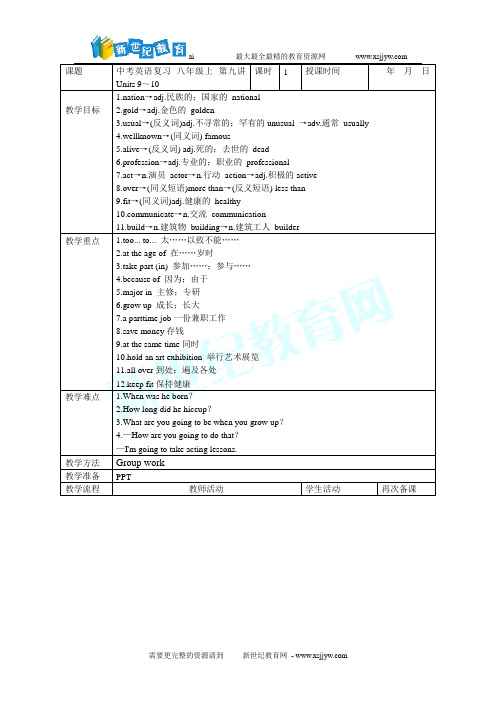
3.take part (in) 参加……;参与……4.because of 因为;由于5.major in 主修;专研6.grow up 成长;长大7.a parttime job一份兼职工作8.save money存钱9.at the same time同时10.hold an art exhibition 举行艺术展览11.all over到处;遍及各处12.keep fit保持健康The car is too expensive for him to afford.The car is so expensive that he can't afford it.The car is not cheap enough for him to afford.车太贵,他买不起。
④当it作形式主语,真正的主语是动词不定式时,此时too相当于very,这种句式表示肯定意义。
如:It's too important to learn English.学习英语很重要。
①too...to...结构中若不定式的宾语与句中主语是we could s____ a large number of money for the state.5.The earth here is r____ and plants grow very well. 6.He has lived in Beijing o_____ two years. 7.Since中。
(bear) in 1960 inShanghai.6.She was an________(usual)girl.7.After a longwalk,I want tostop ________(have) a rest.三、根据汉语意思。
人教版八年级英语Unit 9-Unit 10【复习课件】-2023年中考英语一轮大单元复习(人教版)

upset .
10.除非我们跟他人交谈,否则我们肯定会感觉更糟。
Unless we talk to someone,we'll certainly feel
11.如果我告诉我的父母,他们会生气的。
If I tell my parents,they'll be angry .
worse .
上一页 返回导航 下一页
for
an exam .
2.很抱歉,我没有空。这个周末我有很多家庭作业。
I'm sorry.I'm not available .I have too
much homework
this weekend.
上一页 返回导航 下一页
3.我记得去年秋天他来看你的时候,我们一起去骑过自行车。
I remember we went bike riding together last fall when he
Friday,December 20th.
8.如果他们今天举t today, half
the
class won't come.
上一页 返回导航 下一页
9.如果我去参加聚会,他们会难过的。
If I go to the party,they will be
visited you.
4.周一晚上你能和我们一起逛逛吗?
Can you hang out with us on Monday night?
5.这个月末,我们全家打算去武汉旅行,看望我的婶婶和叔叔。
My family is taking
a
trip to Wuhan at the end of this
上一页 返回导航 下一页
中考英语一轮复习 八上Unit9 - 10 课程教学设计
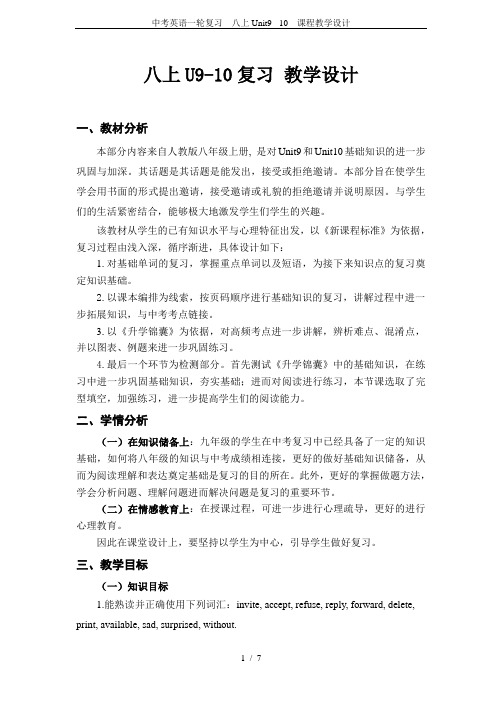
八上U9-10复习教学设计一、教材分析本部分内容来自人教版八年级上册, 是对Unit9和Unit10基础知识的进一步巩固与加深。
其话题是其话题是能发出,接受或拒绝邀请。
本部分旨在使学生学会用书面的形式提出邀请,接受邀请或礼貌的拒绝邀请并说明原因。
与学生们的生活紧密结合,能够极大地激发学生们学生的兴趣。
该教材从学生的已有知识水平与心理特征出发,以《新课程标准》为依据,复习过程由浅入深,循序渐进,具体设计如下:1.对基础单词的复习,掌握重点单词以及短语,为接下来知识点的复习奠定知识基础。
2.以课本编排为线索,按页码顺序进行基础知识的复习,讲解过程中进一步拓展知识,与中考考点链接。
3.以《升学锦囊》为依据,对高频考点进一步讲解,辨析难点、混淆点,并以图表、例题来进一步巩固练习。
4.最后一个环节为检测部分。
首先测试《升学锦囊》中的基础知识,在练习中进一步巩固基础知识,夯实基础;进而对阅读进行练习,本节课选取了完型填空,加强练习,进一步提高学生们的阅读能力。
二、学情分析(一)在知识储备上:九年级的学生在中考复习中已经具备了一定的知识基础,如何将八年级的知识与中考成绩相连接,更好的做好基础知识储备,从而为阅读理解和表达奠定基础是复习的目的所在。
此外,更好的掌握做题方法,学会分析问题、理解问题进而解决问题是复习的重要环节。
(二)在情感教育上:在授课过程,可进一步进行心理疏导,更好的进行心理教育。
因此在课堂设计上,要坚持以学生为中心,引导学生做好复习。
三、教学目标(一)知识目标1.能熟读并正确使用下列词汇:invite, accept, refuse, reply, forward, delete, print, available, sad, surprised, without.2.能熟读并正确使用下列日常用语:turn down, think of, look forward to doing sth.3.能做出清晰明确的邀请函并能礼貌的拒绝要求与愉快的接受邀请并掌握常用句型:I look forward to hearing from you.I want to go, but I’m not available.(二)能力目标通过阅读训练,掌握读前预测,抓住段落要点和全文大意,查找细节信息等阅读技巧,提高阅读与表达能力。
初中英语中考复习 中考英语(人教新课标)一轮复习教案:八年级上册Unite 9

第15课时课题:8年级上册(U9)一、目标:1. 识记: 与“晚会”、“仪式”等相关的词2. 理解:情态动词can 的用法3. 运用: 学会用can 句型来礼貌邀请别人及礼貌接受或拒绝邀请二、重点:1. 复习can 的用法2. 礼貌发出、接受、拒绝邀请三、难点:学会运用can 句型来礼貌邀请别人及礼貌接受或拒绝邀请四、知识梳理:(一) 句型与词汇1.-- Can you come to my party on Saturday ?-- Sure, I ’d love to.或 -- Sorry, I ’m not available.解析:① 英语中表示非正式的且较随便的邀请或请求往往用“Canyou … ?”②当对方发出邀请或请求时的回答方式有:•肯定回答:I ’d love / like to. 我很乐意。
Certainly! / Of course! / Sure! 当然可以。
No problem. 没问题。
•否定回答:I ’d love to, but … 我很乐意,但是…I ’m afraid not. 恐怕不行。
I ’m sorry, I … 对不起,我… 拓展:各类party birthday party , the opening of …, English party, New Year ’s party, singing party, dancing party, house warming party聚会相invite, invitation, prepare, preparation, accept, refuse, turn中考一轮复习教学参考资料关词down, reply, hear from, celebrate2. -- What’s today ? 今天是星期几,几号?-- It’s Monday the 14th.the day before yesterday yesterday today tomorrowthe day aftertomorrow前天昨天今天明天后天weekday Monday Tuesday Wednesday Thursday Fridayweekend Saturday Sunday 拓展:①-- What day is it today? 今天星期几?-- It’s Monday.②-- What’s the date today? 今天几号?-- It’s the 14th.3. I’m busy now. Let’s go there another time.我现在很忙。
中考英语复习第9讲 八年级(上)Units 9~10

【拓展精析】 Can you...?意为“你能……吗?”是向别人发出邀请,委婉地请求某 人去做某事的句型。情态动词can意为“可以;能”,也可以用情态动词 could。could的语气要比can委婉、客气,显得更有礼貌,而can则更加口 语化。 注意:向别人发出邀请、请求或征求意见时,有以下几种常用表达: Can/Could you...?/Would you like to...?/What/How about...?/Shall (we) ...?/May I invite you to...? 其肯定回答,即接受别人的邀请时,常用以下句子:Yes,I'd love to./I'd like to./Yes.It's very nice/kind of you./That sounds great./That sounds like fun./I'm happy/glad to...
话题 Unit 9 Invitations(邀请) Unit 10 Decision making(做决定)
►available 【典例在线】 Are you available for a meeting tomorrow morning?你明早有空出席会 议吗? I'll send you all the magazines available. 我会把所有能获得的杂志都给 你寄去。 【精析拓展】 available作形容词,意为“有空的”,常作表语,相当于free。 available作形容词还可意为“可获得的”。
A.with B.for C.without D.from
►look after 【典例在线】 I need to look after my baby sister at home.我需要在家照顾我的小妹妹 。 【拓展精析】 look after意为“照顾;照看”,其同义短语为take care of。 关于look的短语归纳: look at看;look for寻找;look up查找;look out小心;look over仔细检 查;look through浏览。
人教版中考英语教材知识复习:八年级上 Units 9~10
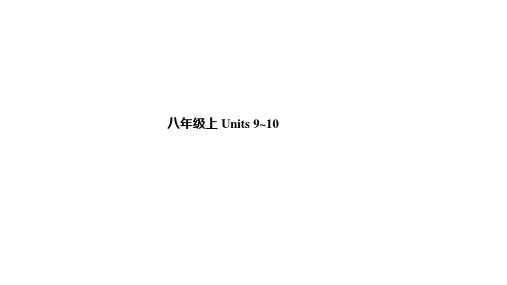
高频 邀请函
告;建议
词汇 3. print (v.)印刷→ printer (n.)印刷工, 8. angry (adj.)生气的,发怒的
打印机
→anger(n.)生气;愤怒
4.surprise (v.&n.)惊奇;使惊奇的;令人感觉意 9. understanding (adj.)善解人意的,体谅
That sounds great. Thank you for inviting (asking) me. It’s very kind (nice) of you. 拒绝邀请 Sorry, I can’t. But... I’m afraid not./ I’d love to, but... Sorry, I’m afraid I can’t.
until的用法 Oh, but Sam isn’t leaving until next Wednesday.哦, 但是萨姆要到下周三才走。(Unit 9, P66) 【透析】(1)until用于肯定句中,意为“直到……为止”,主 句中的谓语动词应用延续性动词。如: I waited for you until ten o’clock last night.我昨 天晚上一直等你到10点。
同义词、近义词、反义词
1. accept (v.)接受→refuse (v.)拒绝
2. look after 照料;照顾→take care of照顾; 照料
3. exam (n.)考试→examination (n.)考试 4. weekday (n.)工作日(星期一至星期五的任何 一天)→ weekend(n.)周末 5.sad (adj.) (令人)悲哀的;(令人)难过的→ glad (adj.)高兴的;愿意的 6.with (prep.)有→ without (prep.)没有;不(
初中八年级英语9单元教案
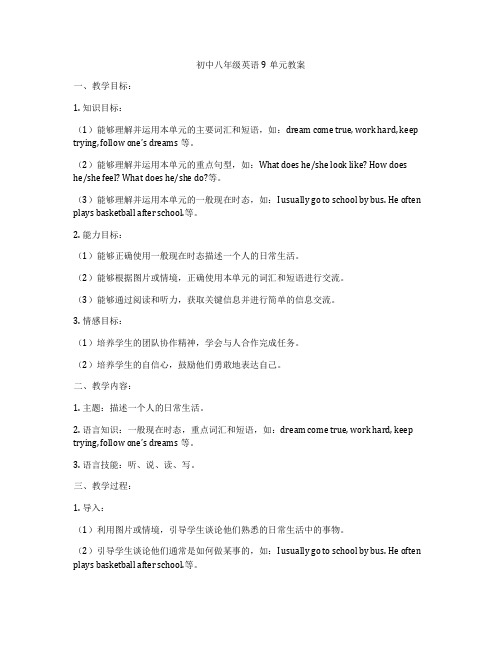
初中八年级英语9单元教案一、教学目标:1. 知识目标:(1)能够理解并运用本单元的主要词汇和短语,如:dream come true, work hard, keep trying, follow one’s dreams等。
(2)能够理解并运用本单元的重点句型,如:What does he/she look like? How does he/she feel? What does he/she do?等。
(3)能够理解并运用本单元的一般现在时态,如:I usually go to school by bus. He often plays basketball after school.等。
2. 能力目标:(1)能够正确使用一般现在时态描述一个人的日常生活。
(2)能够根据图片或情境,正确使用本单元的词汇和短语进行交流。
(3)能够通过阅读和听力,获取关键信息并进行简单的信息交流。
3. 情感目标:(1)培养学生的团队协作精神,学会与人合作完成任务。
(2)培养学生的自信心,鼓励他们勇敢地表达自己。
二、教学内容:1. 主题:描述一个人的日常生活。
2. 语言知识:一般现在时态,重点词汇和短语,如:dream come true, work hard, keep trying, follow one’s dreams等。
3. 语言技能:听、说、读、写。
三、教学过程:1. 导入:(1)利用图片或情境,引导学生谈论他们熟悉的日常生活中的事物。
(2)引导学生谈论他们通常是如何做某事的,如:I usually go to school by bus. He often plays basketball after school.等。
2. 新课呈现:(1)呈现本课的主题,让学生猜测将要学习的内容。
(2)利用图片或情境,引入本课的词汇和短语,如:dream come true, work hard, keep trying, follow one’s dreams等。
中考英语总复习-八年级英语上下册教案

反
思
6.be good for/at/with/to的用法
7.how long/soon/far/often的用法
8.can’t wait to do sth.与can’t help doing sth.的区别
限
时
自
测
板
书
设
计
阶段复习八上Unit1-3
1.复习回顾八上Unit1-3基础知识。
2.解析八上Unit1-3考点。
九年级英语教案
课题
阶段复习八上Unit1-3
课时
1
设计者
课型
新授课
年级
九
执教人
学习目标
1.复习回顾八上Unit1-3基础知识。
2.解析八上Unit1-3考点。
3.体验中考真题。
学习
重难
点
1.复习回顾八上Unit1-3基础知识。
2.解析八上Unit1-3考点。
学
习
策
略
模仿和演练
笔记
推断
建构
教学过程
教学流程导学案归纳明标导学
1.复习回顾八下Unit1-3基础知识。
2.解析八下Unit1-3考点。
3.体验中考真题。
知
识
点
回
顾
重点单词
重点短语
重点句型
交际用语
语法归纳
真
题
再
现
考
点
解
析
1.time的用法
2.advice的用法
3.频度副词的用法
4.until的用法
5.a few,few, a little与little的用法
人教版新目标英语中考一轮复习 八下Unit9 复习教案
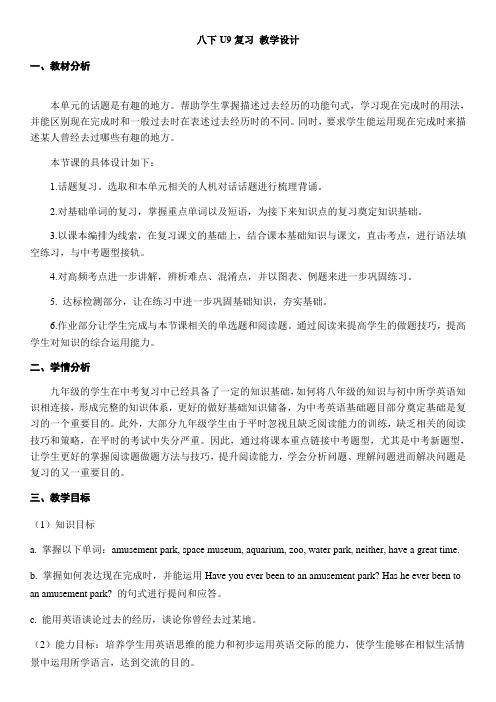
八下U9复习教学设计一、教材分析本单元的话题是有趣的地方。
帮助学生掌握描述过去经历的功能句式,学习现在完成时的用法,并能区别现在完成时和一般过去时在表述过去经历时的不同。
同时,要求学生能运用现在完成时来描述某人曾经去过哪些有趣的地方。
本节课的具体设计如下:1.话题复习。
选取和本单元相关的人机对话话题进行梳理背诵。
2.对基础单词的复习,掌握重点单词以及短语,为接下来知识点的复习奠定知识基础。
3.以课本编排为线索,在复习课文的基础上,结合课本基础知识与课文,直击考点,进行语法填空练习,与中考题型接轨。
4.对高频考点进一步讲解,辨析难点、混淆点,并以图表、例题来进一步巩固练习。
5. 达标检测部分,让在练习中进一步巩固基础知识,夯实基础。
6.作业部分让学生完成与本节课相关的单选题和阅读题。
通过阅读来提高学生的做题技巧,提高学生对知识的综合运用能力。
二、学情分析九年级的学生在中考复习中已经具备了一定的知识基础,如何将八年级的知识与初中所学英语知识相连接,形成完整的知识体系,更好的做好基础知识储备,为中考英语基础题目部分奠定基础是复习的一个重要目的。
此外,大部分九年级学生由于平时忽视且缺乏阅读能力的训练,缺乏相关的阅读技巧和策略,在平时的考试中失分严重。
因此,通过将课本重点链接中考题型,尤其是中考新题型,让学生更好的掌握阅读题做题方法与技巧,提升阅读能力,学会分析问题、理解问题进而解决问题是复习的又一重要目的。
三、教学目标(1)知识目标a. 掌握以下单词:amusement park, space museum, aquarium, zoo, water park, neither, have a great time.b. 掌握如何表达现在完成时,并能运用Have you ever been to an amusement park? Has he ever been to an amusement park? 的句式进行提问和应答。
人教版英语 八年级(上) Units 9~10中考复习

考点4
A. made
B. received
考点5
C. accepted
D. knew
八年级(上) Units 9~10
返回目录
考点1
7. I’m very happy to ____D____ an email from my old friend.
考点2
A. accept
C. follow
B. correct D. receive
考点3
8. When we arrived in Yunnan, we ____C____ a warm welcome
from local people.
考点4
A. accepted
B. offered
C. received
考点5
D. provided
八年级(上) Units 9~10
返回目录
满分点拨
not available Jake take a trip to Wuhan
help out with the pary preparations
八年级(上) Units 9~10
词形词块 拓展
返回目录
补充词块
教材重点 句式
教材语篇 过词汇
语法
Passage 2 1. tell 2. miles 3. and 4. careless 5. more 6. problems 7. from 8. step 9. experience 10. solving
考点4
的东西。如:信件、礼 750,000 visitors.每年它接待超
receive 物等。注意:表示“接见 过75万的游客。[九(全)Unit 8
中考复习教案第14讲八年级下9-10
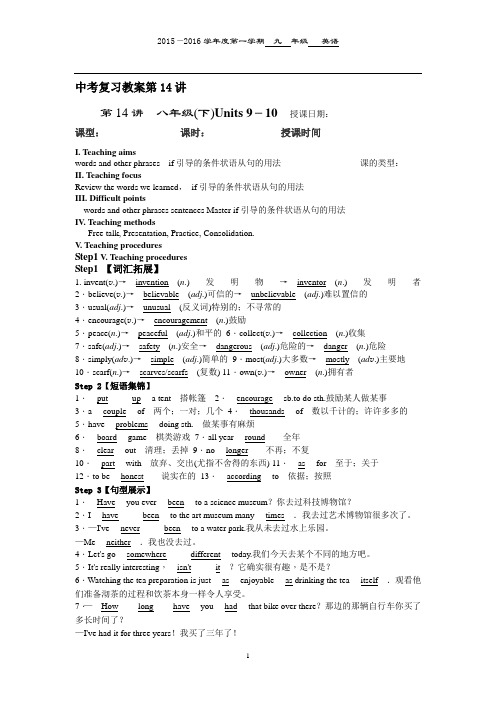
中考复习教案第14讲第14讲八年级(下)Units 9-10 授课日期:课型:课时:授课时间I. Teaching aimswords and other phrases if引导的条件状语从句的用法课的类型:II. Teaching focusReview the words we learned,if引导的条件状语从句的用法III. Difficult pointswords and other phrases sentences Master if引导的条件状语从句的用法IV. Teaching methodsFree talk, Presentation, Practice, Consolidation.V. Teaching proceduresStep1 V. Teaching proceduresStep1【词汇拓展】1.invent(v.)→__invention__(n.)发明物→__inventor__(n.)发明者2.believe(v.)→__believable__(adj.)可信的→__unbelievable__(adj.)难以置信的3.usual(adj.)→__unusual__(反义词)特别的;不寻常的4.encourage(v.)→__encouragement__(n.)鼓励5.peace(n.)→__peaceful__(adj.)和平的6.collect(v.)→__collection__(n.)收集7.safe(adj.)→__safety__(n.)安全→__dangerous__(adj.)危险的→__danger__(n.)危险8.simply(ad v.)→__simple__(adj.)简单的9.most(adj.)大多数→__mostly__(ad v.)主要地10.scarf(n.)→__scarves/scarfs__(复数) 11.own(v.)→__owner__(n.)拥有者Step 2【短语集锦】1.__put___ __up__ a tent搭帐篷2.__encourage__ sb.to do sth.鼓励某人做某事3.a __couple__ of两个;一对;几个4.__thousands__ of数以千计的;许许多多的5.have __problems__ doing sth.做某事有麻烦6.__board__ game棋类游戏7.all year __round__全年8.__clear__ out清理;丢掉9.no __longer__不再;不复10.__part__ with放弃、交出(尤指不舍得的东西) 11.__as__ for至于;关于12.to be __honest__说实在的13.__according__ to依据;按照Step 3【句型展示】1.__Have__ you ever __been__ to a science museum?你去过科技博物馆?2.I __have___ __been__ to the art museum many __times__.我去过艺术博物馆很多次了。
人教版中考英语一轮复习第八讲 八年级(上)Units 9-10教案

人教版中考英语一轮复习第八讲八年级(上)Units 9-10教案一. 教材分析人教版初中英语八年级上册Units 9-10,主要围绕着日常生活中的各种活动和兴趣爱好展开。
Unit 9主要介绍了不同国家的节日,如春节、圣诞节等,以及不同国家的习俗。
Unit 10则以介绍不同人的兴趣爱好为主线,如打篮球、跳舞、画画等。
这两个单元的话题贴近学生的生活,有利于激发学生的学习兴趣和参与度。
二. 学情分析八年级的学生已经掌握了基本的英语语法和词汇,具备一定的听说读写能力。
但是,部分学生在口语表达和听力方面还存在一定的困难。
因此,在教学过程中,需要关注这部分学生的需求,给予他们更多的关注和帮助。
三. 教学目标1.知识目标:学生能够掌握Units 9-10中的核心词汇和句型,了解不同国家的节日和习俗,以及不同人的兴趣爱好。
2.能力目标:学生能够在真实情境中运用所学知识进行交际,提高听、说、读、写的能力。
3.情感目标:学生能够培养对不同文化的尊重和理解,增强与人沟通、合作的意识。
四. 教学重难点1.重点:学生能够掌握Units 9-10中的核心词汇和句型,正确运用它们进行交际。
2.难点:学生能够在真实情境中灵活运用所学知识,提高听、说、读、写的能力。
五. 教学方法1.任务型教学法:通过设定各种真实的任务,让学生在完成任务的过程中运用所学知识,提高实际运用能力。
2.情境教学法:创设各种真实的语境,让学生在语境中感知、理解和运用语言。
3.小组合作学习:引导学生进行小组讨论和合作,培养他们的团队精神和沟通能力。
六. 教学准备1.教师准备:充分了解学生的学习情况,设计有针对性的教学活动。
2.学生准备:预习Units 9-10的内容,准备好相关的学习资料。
七. 教学过程1.导入(5分钟)利用图片或视频展示不同国家的节日和习俗,引导学生谈论自己喜欢的节日和习俗。
2.呈现(10分钟)呈现Unit 9-10的核心词汇和句型,通过图片、实物或情境展示,让学生在真实语境中感知和理解语言。
中考英语复习 八年级上,八下教案-10
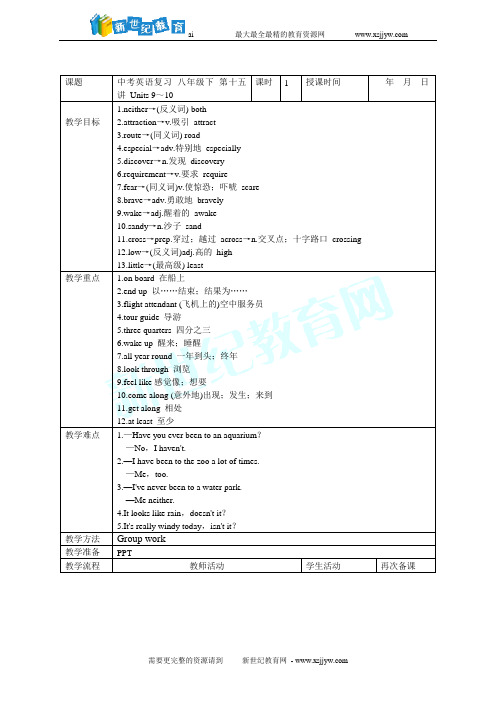
课题中考英语复习八年级下第十五讲Units 9~10课时 1 授课时间年月日教学目标1.neither→(反义词) both2.attraction→v.吸引attract3.route→(同义词) road4.especial→adv.特别地especially5.discover→n.发现discovery6.requirement→v.要求require7.fear→(同义词)v.使惊恐;吓唬scare8.brave→adv.勇敢地bravely9.wake→adj.醒着的awake10.sandy→n.沙子sand11.cross→prep.穿过;越过across→n.交叉点;十字路口crossing12.low→(反义词)adj.高的high13.little→(最高级) least教学重点 1.on board 在船上2.end up 以……结束;结果为……3.flight attendant (飞机上的)空中服务员4.tour guide 导游5.three quarters 四分之三6.wake up 醒来;睡醒7.all year round 一年到头;终年8.look through 浏览9.feel like感觉像;想要e along (意外地)出现;发生;来到11.get along 相处12.at least 至少教学难点 1.—Have you ever been to an aquarium?—No,I haven't.2.—I have been to the zoo a lot of times.—Me,too.3.—I've never been to a water park.—Me neither.4.It looks like rain,doesn't it?5.It's really windy today,isn't it?教学方法Group work教学准备PPT教学流程教师活动学生活动再次备课1.—I've never been to a water park.——我从未去过水上公园。
中考复习教案第9讲八年级上9-10.docx
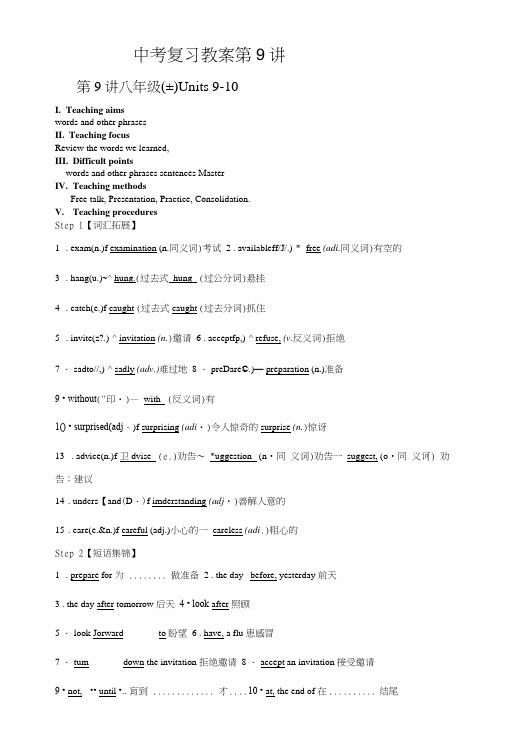
中考复习教案第9讲第9讲八年级(±)Units 9-10I.Teaching aimswords and other phrasesII.Teaching focusReview the words we learned,III.Difficult pointswords and other phrases sentences MasterIV.Teaching methodsFree talk, Presentation, Practice, Consolidation.V.Teaching proceduresStep 1【词汇拓展】1. exam(n.)f examination (n.同义词)考试2 . availableff/J/.)-*- free (adi.同义词)有空的3. hang(u.)~^ hung.(过去式_hung_ (过公分词)悬挂4. catch(e.)f caught (过去式caught (过去分词)抓住5. invite(z?.)-^ invitation (n.)邀请6 . acceptfp,)-^ refuse, (v.反义词)拒绝7 ・ sadto//,)-^ sadly (adv.)难过地8 ・ preDare©.)— preparation (n.)准备9 • without("印・)—with_ (反义词)有1() • surprised(adj・)f surprising (adi・)令人惊奇的surprise (n.)惊讶13. advice(n.)f 卫dvise_ (e.)劝告〜*uggestion_ (n•同义词)劝告一suggest, (o•同义诃) 劝告;建议14. undcrs【and(D・)f imderstanding (adj・)善解人意的15. care(e.&n.)f careful (adj.)小心的一careless (adi.)粗心的Step 2【短语集锦】1. prepare for 为 ........ 做准备2 . the day _before, yesterday 前天3 . the day after tomorrow 后天4 • look after 照顾5 ・ look Jorward _______ to 盼望6 . have, a flu 患感冒7 ・ tum ______ down the invitation 拒绝邀请8 ・ accept an invitation 接受邀请9 • not, - •• until •.. 肓到 ............. 才.... 10 • at, the end of 在.......... 结尾11 . _hear ______ from 收到某人的来信12 . keep . ..to oneself 保守秘密13 .be 卫ngry ______ wi(h_ sb.生某人的气14 . _give_ sb.some advice 给某人提些建议15 . be afraid to do sth.害怕做某事16 . be worried about 着急;担心17 . make mistakes 犯错18 ・ _run _____________ f rom 逃避;回避Step 3【句型展示】1・— Can you come to my party?你能来参加我的聚会吗?—Sure , I'd love ________ .当然,我很乐意。
新目标九年级英语复习教案 八年级英语 上册
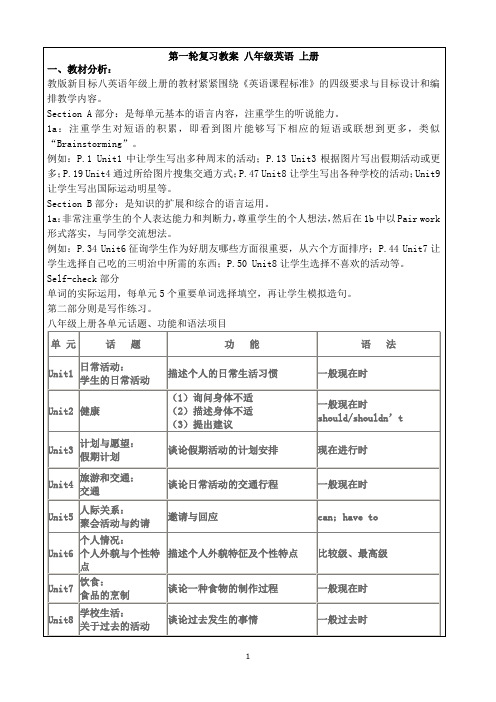
30.too much+不可数名词 太多 too many+可数名词复数 太多 much too+形容词 太
用法:
1.buy sth. for sb. / buy sb. sth.为某人买某物
2.taste / look/sound/smell good. 尝起来/看起来/听起来/闻起来不错
七、教学过程:
第一环节:出示教学目标
各个单元要点及grammar focus
第二环节:课堂导入
对话练习、口语练习,单词听写
第三环节:师生活动一
Unit1 Where did you go on vacation?
短语归纳
1.go on vacation去度假 2.stay at home待在家里 3.go to the mountains去爬山
7.It’s+ adj.+(for sb)+ to do sth. 对某人来说,做某事是……的。
8. ask sb. about sth.向某人询问某事
9.by doing sth. 通过做某事(回答how引导的疑问句)
10.What’s your favorite…?你最喜爱的…是什么?
11.the best way to do sth.做某事的最好方式 12.How come ?怎么回事?第四环节:当堂训练
例如:P.1 Unit1中让学生写出多种周末的活动;P.13 Unit3根据图片写出假期活动或更多;P.19 Unit4通过所给图片搜集交通方式;P.47 Unit8让学生写出各种学校的活动;Unit9让学生写出国际运动明星等。
Section B部分:是知识的扩展和综合的语言运用。
中考英语一轮复习教案 八年级下册Unit 9

八年级下册(U9)一、目标:1. 识记:熟练识记本单元单词表上所有单词、短语和目标语言;动词过去式和过去分词的构成规则。
2. 理解:理解现在完成时的用法(二):用have/has been to ...来谈论过去的经历。
3. 运用:能够运用have/has been to ...来谈论过去的经历;4. 能运用阅读技巧Making notes更好地记住所学内容。
5. 教材中的重点固定搭配:a couple of, thousands of(hundreds of, millions of, billions of), on the one hand... On theother hand...,all year round, put up, lead to, encourage sb.to do sth., something/anything good to eat, have problems doing sth.(=have a hard time doing sth./have trouble doing st h.), during the daytime, wake up, …二、重点:1.用have/has been to ...来谈论过去的经历。
2. have/has been to ...与have/has gone to ...的区别。
三、难点:1. have/has been to ...与have/has gone to ...的区别。
四、知识梳理:1.句型与词汇:(1)词汇:重点“四会”词camera, toilet, province, spring, fox, collect, encourage, fear, progress, rapid, peaceful, perfect, safe, unbelievable, unusual, social, whenever, whether,“四会”词itself, German, ride, thousand, simply, Ind ian, Japanese, mostly,“三会”词amusement, amuse ment park, somewhere, invent, invention, tea art, performance, tea set, theme, equator, location(2)句型:① --Have you ever been to a science museum?--Yes, I’ve been to a science museum./No, I’ve never been to a sciencemuseum.② --Have you ever visited the space museum?-- Yes, I have. I went there last year./ No, I haven’t.③ --I’ve been to the art museum many times.--Me, too. And I’ve also visited the nature museum.④ --I’ve never been to a water park.--Me neither.⑤ --Hav e you ever been there?--Yes, I have./No, I haven’t.⑥ --Where is your English teacher?--He’s (=He has) gone to Beijing for a meeting. He will be back in three days.2. 语法:现在完成时的用法(二):Have/has been to & have/has gone to的区别:He has been to Beijing. 他曾去过北京。
人教新目标2019年初三中考英语八年级(下)U9-10总复习教学案

2019年初三中考英语八年级(下)U9-10总复习教学案词汇拓展1. society n.社会→____________adj.社会的2. peace n.和平→____________adj.和平的;安宁的3. memory n.记忆;回忆→____________v.记忆;记住4. scarf n.围巾;披巾;头巾→____________(pl.)5. believe v.相信→____________adj.可信的→____________adj.难以置信的;不真实的6. collect v.收集→____________n.收集物;收藏品→____________n.收集者;收藏家7. hold v.拥有;抓住→____________(过去式/过去分词)8. safe adj.安全的→____________n.安全;安全性9. simple adj.简单的→____________adv.仅仅;只;不过10. most adj.大部分的;主要的→____________adv.主要地;通常11. especial adj.特殊的;特别的→____________adv.尤其;特别;格外完形填空I moved to a new neighborhood two months ago. A taxi driver lived in a house with a large garage across the road. He’s single parent with two school-age children. At the end of the day, he would __1__ his taxi on the road. “ Why he did not park it in the garage?” I asked myself.Then, one day I __2__ that he had another car in his garage. In the afternoon he would come home __3__ work, leave his taxi and go out for his __4__ car, not in his taxi. I felt it was __5__.I was curious to see his personal car but did not __6__ it until I happened to be outside one evening two weeks later, when the garage door was __7__ and he drove out in his “own” car: a Rolls-Royce(劳斯莱斯)! It shook me completely __8__ I realized what that meant. You see, he was a taxi driver. But deep inside, he saw himself as something else: a Rolls-Royce owner and a(n)__9__. He drove others in his taxi but himself and his children in his Rolls-Royce. The world looked at his taxi and called him a taxi driver. But for him, a taxi was __10__ something he drove for a life.We go to bed every night and __11__ every morning as parents or children, not as bankers, CEOs or professors. We go for a __12__ as close friends or go for a vacation as a family. We love life as it is. Yet often, we base our entire happiness and __13__ on how high we climb the socialladder(梯子)—how much bigger and better a __14__ we have. And we fail to notice Rolls-Royce, by keeping it dusty in our garage. We should pay more attention to __15__ we are than what we do!1. A. park2. A. learnt3. A. for4. A. another5. A. useful6. A. get7. A. broken8. A. once9. A. father10. A. yet B. drive C. checkC. toldD. repairD. remember B. understoodB. atC. withoutD. fromD. firstB. otherB. carefulB. makeB. closedB. beforeB. sonC. thirdC. wastefulC. buyD. painfulD. haveD. openD. untilD. engineerD. stillD. warm upD. partyD. wishesC. paintedC. whenC. driverC. justC. take upC. testB. never11. A. stay up B. wake up12. A. competition B. performance13. A. success B. plans14. A. garden B. garage15. A. who 阅读理解B. whatC. beautyC. carD. taxiD. whereC. whichAThank you for your interest in volunteering with the city of Melbourne's tourism program. The Tourism branch generally conducts volunteer recruitment(招募) sessions twice a year. The next intake is likely to be around October or November 2014.If you would like to receive an email advising you of the next recruitment session, please email tourism@ .au.Volunteering with Tourism Melbourne:Volunteers play a vital role in the City of Melbourne's tourism services.They provide information on Melbourne to around two million visitors each year.Their love and knowledge of the city and regional Victoria adds to Melbourne's reputation as a friendly, welcoming and culturally vibrant(充满活力的) city.The volunteer programs include:※ City Ambassadors(大使)※ Melbourne Visitor Booth at Bourke Street Mall※ Melbourne Visitor Centre at Federation Square※ Melbourne Greeter ServicePlaces are limited and potential volunteers must participate(参加) in a selection process based around the following basis.Volunteers must be:※ interested in Melbourne※ customer service focused※ able to use computer※available for one fourhour shift(either morning or afternoon) each week for a minimum of one year※ team players who love meeting people※ able to show a commitment to the City of Melbourne's values(as outlined in the online application)An extensive training program and ongoing support is provided.More information:To find out more about becoming a volunteer, Contact us online or phone the City of Melbourne's Volunteer Project Officer,Tourism Melbourne on (03) 9658 9658.For other volunteering opportunities,see national volunteer recruitment website GoV olunteer.1.What is this passage mainly about?A.Melbourne's tourism services.B.Tourism volunteer program.C.Tour tips on visiting Melbourne.D.The places of interest of Melbourne.2.One of the qualifications(资格) of a tourism volunteer is “________”.A.The next intake is likely to be around October or November 2014.B.Volunteers must be team players who love meeting people.C.An extensive training program and ongoing support is provided.D.V olunteers play a vital role in the City of Melbourne's tourism services.3.Which of the following is true?A.The local volunteer recruitment website is Go Volunteer.B.There are about three million visitors to Melbourne each year.C.The Tourism branch generally conducts volunteer recruitment sessions once a year.D.People call (03)9658 9658 to know more information about becoming a tourism volunteer.BNext time you’re unhappy or complaining about your life, don’t turn to a cheerful comedy.You might find a tear-jerking tragedy(催人泪下的悲剧) is just the thing you need to brighten your day.A team of researchers at Ohio State University, US, has found sad movies can make people happier, Science Daily reported last month.Many people find tragedies make them realize how good their own lives are, the study showed.“People seem to use tragedies as a way to reflect on the important relationships in their own lives,”said Silvia Knobloch-Westerwick, leader of the study. “Tragic stories often focus on themes of eternal(永恒的) love, and this leads viewers to think about their loved ones and count their good and helpful things.”In the study, researchers gathered 361 college students and showed them the 2007 movie, Atonement. The movie is about two lovers who are separated(分离) and finally die during World War II. Before and after the movie, the students were asked questions measuring(衡量) how happy they were with their lives. Researchers also asked them before, after and three times during the movie to measure various emotions, including sadness.Researchers found that the sadder students felt while watching the movie, the more likely they were to think about real people they had close relationships with in life. This increased their happiness after watching the movie.Knobloch-Westerwick explained that negative(消极的) moods make people more thoughtful.“Positive(积极的) emotions show that everything is fine, you don’t have to worry, you don’t have to think about problems in your life,” she said. “But negative emotions, like sadness, make you think more critically about your situation. So seeing a tragic movie may make you sad, but that will make you to think more about your own close relationships and appreciate them more.”The link between watching a tragic story and feeling better has long been recognized. The ancient Greeks even had a word for the feeling of happiness after seeing something sad that led to the modern English word “catharsis (宣泄)”.The study also showed that relationships are a very important source of happiness in our lives, so it is no surprise that thinking about your loved ones makes you happier, researchers said.1. Which of the following about the study of Ohio State University is NOT true?A. Only sadness is measured in the study.B. Students’ emotions are measured by asking questions.C. The study shows relationships are a source of happiness.D. Those who felt sadder when watching the movie were more likely to be happier after that.2. Why are ancient Greeks mentioned in the passage?A. To introduce the meaning of the word “Catharsis”.B. To explain the importance of knowing how to become happier.C. To prove that they were of high intelligence and guessed its meaning.D. To tell readers the relationship between tragedies and happiness was found long ago.3. From Knobloch-Westerwick’s explanation, we can learn that.A. seeing tragedies makes you more thoughtfulB. positive emotions make you think more about your relationshipsC. negative emotions show you have no need to think about your situationD. after seeing comedies, you will appreciate your close relationships more4. Which is the title of the passage?A. Watching sad films may start smilesB. There is eternal love in the worldC. It’s useless to complain about lifeD. Comedies should make way for tragediesCSpending two or three hours playing outdoors each day can reduce the chance of becoming short-sighted, a research shows. It challenges the belief(信念) that short-sightedness is caused by computer use, watching TV or reading in weak light.The Australian government researchers believe that the sunlight is good for people’s eyes.They compared the vision(视力) and habits of 100 seven-year-old children in Singapore and Australia. In all, 30% of the Singaporean children were short-sighted—this rate(比率) was ten times higher than Australian children.Both groups spend a similar amount(数量) of time reading, watching television and playing computer games. However the Singaporean children spent an average (平均) of only half an houra day outdoors—90 minutes less than the Australian children.Professor Ian Morgan, from the Australian Research Council’s vision Centre, said, “H umans are naturally long-sighted, but when people begin to go to school and spend little or no time outdoors, the number of short-sighted people gets larger. We’re also seeing more and more short-sighted children in cities all around the world and the main reason may be that city childrenspend less time outdoors.Daylight can be hundreds of times brighter than indoor light. But why does playing outside prevent us from becoming short-sighted? Scientists believe that natural light has a special chemical(化学物质) which stops the eyeball from growing out of shape and prevents people from becoming short-sighted.So be outdoors. It doesn’t matter if that time is spent having a picnic or having sports.1How much time did the Australian children spend outdoors on average according to the research?A. 30 minutes.B. 60 minutes.C. 90 minutes.D. 120 minutes.2 Which of the following is TRUE according to the passage?A. If people spend less time outdoors they will certainly become short-sighted.B. There are fewer short-sighted Singaporean Children than Australian children becausethey have more knowledge of protecting their eyesight.C. There will be fewer risks of getting short-sighted if people spend two or three hours a dayplaying outside.D. When people begin to go to school they will become long-sighted.3What is the fifth paragraph mainly about?A. Why natural daylight has a special chemical.B. Why daylight prevents people from becoming short-sighted.C. Why daylight is much brighter than indoor light.D. What the special chemical which can stop eyeballs from growing out of shape is.短文改错。
人教版初三第一轮复习八年级下册unit9复习教学案(无答案)

_________学校八年级下册英语Unit 9 复习教学案6. I wonder how much more computers will be able to do in the future。
我想知道将来电脑还能够做些什么事情。
7. Watching the tea preparation is just as enjoyable as drinking the tea itself.8. You won’t have any problem getting rice, noodles or dumplings.(黑体部分的运用)9. It might seem strange to go to a zoo when it’s dark. (seem的用法)10. It’s not too far from China.活学活用:1. -Where is John?- He_____________Canada.A. has been toB. has gone toC. have gone to2. Bill has never been to the Great Wall. _____________.A. So has Tom.B. Neither did TomC. Neither has Tom3. My brother has some difficulties _______ the work by himself.A. to finishB. finishingC. finishes4. Listening to music is as _____ as watching TV.A. more enjoyableB. enjoyableC. the most enjoyable5. They want to go ____________ this time.A. interesting somewhereB. exciting anywhereC. somewhere wonderful Step 4. 课本同步检测(10 minutes)一、课文填空(每空一词)Most large ______(city) have zoos but have you ever _____(be) to a zoo at night? Singapore has a Night Safari. It might seem strange to go to a zoo when it’s dark. However, if you go to see lions, tigers or foxes, during the daytime, they’ll __________ (probable) be _________(sleep)! A lot of animals only wake up at night, so this is the ________(good) time to watch ______ (they). At the Night Safari you can watch these animals in a more natural environment _______ in a normal zoo.二、中英互译:1. 李先生在哪里?他去长沙了。
Unit 9 单元综合复习 教学设计人教版英语八年级下册

Unit 9 Have you ever been to a museum?复习课教学设计【Revision aims】1.现在完成时的结构: have / has + 过去分词:特殊结构have / has been to/gone to +地点名词.2. 用法: 表过去某一时间发生的动作或状态一直延续到现在(强调现在), 动作或状态一般是延续性的。
3.区分:一般过去式与现在完成时4.背熟句型:Have you ever been to a museum?教学重难点:能用现在完成时(have/ has+ 过去分词)谈论表达自己的经历,来体会别人的感受。
【教学准备】学生准备:1、搜集自己去某地旅游观光的照片。
2、复习本单元基础词汇,完成以下复习作业I can translate(1)我是一名老师十五年了(2)我学英语已经五年了(3)自从搬到边院他就是一名清洁工(4)你是一名学生多少年了?八年了。
(5)他学英语多少年了?三年了老师准备:搜集有关现在完成时的微视频并制成多媒体课件,以备课堂之用。
深入研究教材,备好课,搜集整理有关中考题,一切以学生为本,服务于学生。
【教学过程】Step I Leading –in and greetingsHello,boys and girls.Welcome to our class!today we will review Unit9 Have you ever been to a museum?So follow me please!Do you like watching a video?OK,let’s enjoy it?What’s it about?【设计意图】让学生看关于现在完成时的一小段微视频,此任务的目的在于激活学生的背景知识,让学生对后续的活动做好心理上和词汇上的准备。
同时以提问一个简单的有关视频问题让学生迅速进入学习状态。
Step II 展示复习目标1现在完成时的结构: have / has + 过去分词:特殊结构have / has been to/gone to +地点名词.2. 用法: 表过去某一时间发生的动作或状态一直延续到现在(强调现在), 动作或状态一般是延续性的。
- 1、下载文档前请自行甄别文档内容的完整性,平台不提供额外的编辑、内容补充、找答案等附加服务。
- 2、"仅部分预览"的文档,不可在线预览部分如存在完整性等问题,可反馈申请退款(可完整预览的文档不适用该条件!)。
- 3、如文档侵犯您的权益,请联系客服反馈,我们会尽快为您处理(人工客服工作时间:9:00-18:30)。
课题中考英语复习八年级下第十一讲Units 1~2课时 1 授课时间年月日教学目标1. pollution→v.污染pollute2.fly→n.航班flight3.probably→(同义词) maybe/perhaps4.predict→n.预言prediction5.unpleasant→(反义词) adj.令人愉快的;惬意的pleasant→adj.高兴的;愉快的pleased→n.高兴;愉快pleasure6.huge→(同义词) large7.possible→(反义词) impossible→adv.possibly8.out of style→(反义短语) in style9.surprise→adj.惊奇的surprised→adj. 令人惊奇的surprising10.fail→n.失败failure→(反义词)v.成功succeed11.return→(同义短语)give back12.organized→v.组织organize教学重点 1.fall in love with爱上(某人或某物)2.go skating去滑冰3.be able to 有能力做某事;会做某事4.come true(希望等)实现;达到5.in the future未来;将来6.hundreds of大量;许多7.keep out不让……进入8.argue with sb. about sth. 就某事同某人争吵9.call sb. up打电话给……10.on the phone在通话;用电话交谈11.pay for付……账;付买……的钱12.the same as与……同样的13.get on相处;进展14.fit...in...找到时间(做某事) 15.as... as possible尽可能……16.all kinds of 各种各样的17.on the one hand(在)一方面18.on the other hand(在)另一方面教学难点 1.Will there be less pollution?2.—What's wrong?—My clothes are out of style.3.—What should I do?—You could write him a letter.教学方法Group work教学准备PPT教学流程教师活动学生活动再次备课1.Do you think there_will_be robots in people's homes?你认为人们家里将会有机器人吗?(Unit 1)本句是一个含有宾语从句的主从复合句,其中宾语从句是there be句式的一般将来时。
①There be表示“某处/某时有某人/某物”,此处的“有”表示存在关系,其主语在There be 后面。
当主语是单数名词或不可数名词时,be 动词用is或was;主语为复数名词时,be动词用are或were。
但当主语为多个名词时,be动词的选择采取就近原则,即与离它最近的名词一致。
如:There is a book and two rulers on the desk.桌子上有一本书和两把尺子。
There are two rulers and a book on the desk.桌子上有两把尺子和一本书。
②There be句型的一般将来时,可用There will be或There is/are going to be...表示,如:There will/is going to be a basketball match this evening.今晚将有一场篮球赛。
③There be句型中就主语提问用What's...如:There's a_picture on the wall.墙上有幅画。
What's on the wall?墙上有什么?④There be句型的反意疑问句中附加疑问句为“be动词的肯定/否定形式+there?”。
如:There are few people in the park,are there?公园里几乎没有人,对吗?2.Will people use money in_100_years?一百年以后人们还使用钱吗?(Unit 1)in 100 years意为“一百年以后”,“in+一段时间”常用于将来时的句子中,意为“在(一段时间)之后”,表示从现在算起多长时间之后,对此提问要用how soon。
如:—How soon will he be back?——多久他才回来?—He will be back in two days.——他两天后回来。
【辨析】in与after①in表示以现在为起点的将来一段时间之后,常用于表示将来的时态中。
②after也表示“在(一段时间)之后”,但多表示过去的一段时间之后,通常用于表示过去的基础知识过关一、用括号内所给单词的适当形式填空(9分)1.My clothes _____ (be) out of style. 2.My dad didn't allow me _________ (argue)with my mom. 3.The old man doesn't like my _____ __ (sister)clothes and haircut.4.They can work out the problems by _____ _____ (them).5.In 100 years,people __________ (work)on a space station.6.In 1863 Lincoln gave _____ ___(free) to all American slaves. 7.So far, man has _____ (send) many manmade satellites to the moon.8.How many ____________ (toothbrush) does your family need?9.I think there will be _______ (few)trees in the future.二、根据汉语提示补全句子(16分)1.暖和的衣服可以御风寒。
Warm clothing will _________ the cold. 2.他将要为这种愚蠢行为而受报应。
He will have to时态中。
但若表示将来某一时刻之后,要用after而不能用in。
如:Mr. Brown will fly to Beijing in 3 hours.三小时后布朗先生将飞往北京。
After half an hour,the boys went to play soccer. 半小时后,男孩们去踢足球了。
She will finish the work after 6 o'clock.她将在六点后完成那项工作。
3.I'll live in Shanghai,because I went to Shanghai last year and fell_in_love_with it.我要住在上海,因为去年我去了趟上海,并喜欢上了那个地方。
(Unit 1)(1)because引导的原因状语从句,表示“对方未知的原因”。
通常用来回答why引导的特殊疑问句,因果关系强,从句可置于主句之前也可置于主句之后。
如:Because there was a lot of traffic,I was late for school yesterday.昨天因为交通拥挤,我上学迟到了。
(2)fall in love with是一个固定短语,意为“喜欢;爱上”,通常指突然间爱上某人或某物。
如:They fell in love with each other.他们相爱了。
4....because I don't like living alone.……因为我不喜欢一个人住。
(Unit 1)【辨析】alone与lonely①alone既可用作副词(单独地;独自地=by oneself),也可用作形容词(单独的;独身的),表示客观情况。
②lonely只能作形容词,表示人主观上感到“孤独的”,感情色彩浓厚;也可修饰地点,意为“人迹稀少的;荒凉的”。
如:Mr. Read lives alone in the lonely village,but he is never lonely.里德先生寡居于偏僻的村庄中却从未感到孤单。
5.Some scientists believe that there will be such robots in the future.有些科学家相信未来将会有这样的机器人。
(Unit 1)6.Everyone else in my class was invited except me...除了我以外,我班其他人都受到了邀请……(Unit 2) _________ this foolish behavior. 3.他一到上海就爱上了这个地方。
He ______________ it as soon as he arrived in Shanghai.4.那个农场主在他的农场里养了几百头猪。
The farmer keeps ____________ pigs on his farm.5.他的理想迟早会实现。
His dream will __________ sooner or later.6.这两位同志相处得很好。
The two comrades ________ very well together.7.也许我们该学会自己做事。
Maybe we ____________ to do things____________.8.现在的中学生压力不是太大了。
Students in high schools today are not under ____________ 三、句型转换(15分) 1.He's getting_a_cold.(就画线部分提问)_____________ with him?2.We get on well with our classmates.(就画【辨析】except,besides与but①except“不包括;除……之外”,不包含后边的内容,前面常用表示整体的词。
②besides“除……之外(还有)”,包括后面的内容。
③but可与except换用,但but常与no one,nobody,nothing,all,everyone,everything 等连用。
